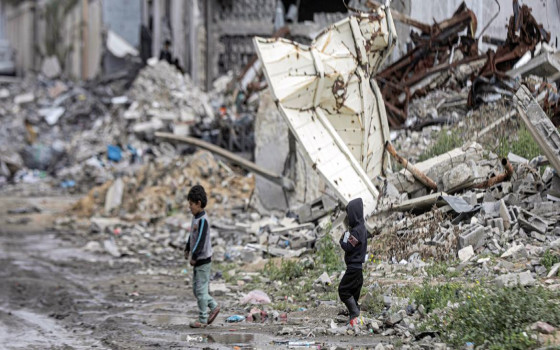Hunger lines in Gaza: The tragedy of obtaining food remains a daily struggle for residents

- Europe and Arabs
- Thursday , 22 May 2025 7:8 AM GMT
Gaza - New York: Europe and the Arabs
Gaza City is witnessing an increasing influx of displaced persons following widespread Israeli evacuation orders affecting several areas in the northern part of the Strip, including Jabalia, Beit Lahia, and Beit Hanoun. This displacement is placing additional pressure on charitable community kitchens (tekiyat), which are operating with limited resources and a severe shortage of food supplies.
A UN correspondent in Gaza visited one of the community kitchens and documented the tragedy of obtaining food, which remains a daily struggle for the people of the Strip.
Families are crowded together with their children, desperately trying to fill their empty pots with food. Children resort to placing pots on their heads to protect themselves from the scorching sun as they wait. A young girl tries to collect leftovers from a cooking pot. According to the UN daily news bulletin we received Thursday morning, "Demand is growing and cannot be met." Mohammed Al-Helou, a supervisor at the community kitchen in Gaza City, explained to the reporter that the kitchen he works in prepares about 500 meals a day. However, he said that this is not enough because the number of displaced people is constantly increasing due to evacuation orders issued by the Israeli army in Jabalia, Beit Lahia, and Beit Hanoun. He added, "Many people come for food, but we cannot meet the growing demand. All the people in this area depend primarily on the meals we prepare in this community kitchen. Thousands arrive daily, and half of them leave without receiving a meal." Hunger is the epitome of tragedy.
Louise Waterridge, spokesperson for the United Nations Relief and Works Agency for Palestine Refugees (UNRWA), said that hunger in Gaza is "only the tip of the iceberg." She continued: "We have enough food in UNRWA warehouses in Amman to feed 200,000 people for a month, and that aid is only three hours away from Gaza. Yet the images we are receiving of malnourished children reflect the scale of the catastrophe. There is no need for further delay. These supplies should have been in Gaza long ago."
Most Gazans are suffering from a lack of purchasing power due to the loss of income resulting from the war, in addition to sharp price increases. Commodities are increasingly scarce in markets due to the total closure on the entry of aid and supplies into Gaza that has been in place for 11 months.
Bread is among the most scarce foodstuffs in the Strip, with many families without it for more than two months due to the lack of flour—either in markets or in humanitarian aid shipments.














No Comments Found